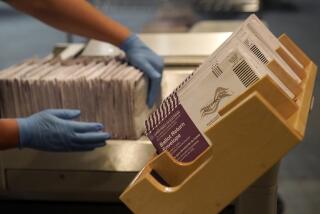Invulnerable Assumptions
- Share via
Before our disbelieving eyes, up in those sudden pillars of dirty smoke went an invisible panoply of shared beliefs about what was certain in our lives, what was possible--and impossible. A haunting question hangs in the autumn air: Will our assumptions about America emerging from crisis prove sufficiently strong?
For a generation, Americans assumed that next year would be better. Inflation or stocks’ transitory tumbles couldn’t cure chronic optimism. Progress was irregular but immutable--in technology, medicine, science, prosperity. Our children would be smarter than we were. We’d provide more for them. They’d live longer and better. Peace at home was a given. In that untroubled environment everyday concerns can seem like crises.
Sure, the last quarter-century’s prosperity had negative blips--brief, violent chapters in places like Grenada and Panama, frightening flurries concerning Three Mile Island and Chernobyl, energy shortages or fears of them. But inevitably our assumptions of peace and stability continued comfortably. Even the Berlin Wall and communism crumbled.
Then, suddenly, a toxic combination of events shattered our territorial invulnerability. Real people, who’d been living among us, hijacked jetliners not to extort and escape but to intentionally fly into buildings. And then they fall down?
How could such high-octane evil exist here without notice? What else did we miss? What might their colleagues do? We quickly question all assumptions and fix on rumors once dismissible as preposterous.
As we begin the laborious process of reconstructing national assumptions for a new reality, it’s important to recall that previous generations of Americans had their shared assumptions shattered by deadly tragedies, unsinkable sunken ships, assassinations, hovering nuclear annihilation, a global depression and global conflicts that killed millions. There was a long wartime in America when the simple appearance of a Western Union messenger caused entire blocks to fall into the silent assumption of a distant death of someone close to home. From those painful episodes and their painstaking recoveries came the comfortable assumptions we just lost.
But wait. We didn’t lose all our assumptions Sept. 11. We saw public servants of the hired, elected and appointed kind perform heroically. We heard tales of those innocents about to die leaving messages of love and then mutinying against their hijackers. Our governments and institutions survived. So did compassion. Millions of Americans gave millions of dollars to help.
How well the country endures to slowly construct a renewed national fabric of shared assumptions will be the more lasting judgment on how we handled this trying time. We can assume that too.






